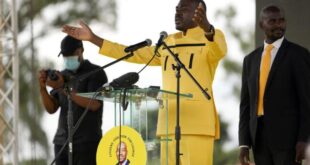African judges have reiterated the need for enacting strong electoral laws to enhance electoral justice and democracy in the African continent saying this is critical in promoting regional peace and security while curbing various forms of unrest such as coups.
This came out at the 3rd annual Africa Electoral Justice Network (AEJN) symposium on electoral justice that is being hosted by the Judicial Service Commission in Victoria Falls.
During the conference, which began Wednesday ending tomorrow, it emerged that there are 24 harmonised elections lined up across the continent this year, which is a litmus test of electoral justice in the continent.
Former director of Political Affairs at the African Union Commission and author of the Africa Charter on Democracy, Elections and Governance, Dr Khabele Matlosa, who was the guest of honour, said it was disturbing that Africa was facing incidents of coups despite the continental body implementing the silencing guns strategy.
He commended Kenya and Malawi for setting the pace and becoming trailblazers in advancing electoral justice. Dr Matlosa said the 2019 global state of democracy report outlines some challenges posed by digital and social media and the impact of democratic haemorrhage such as loss of faith in elections as evidenced by low voter turnout in each election and dwindling public trust in leadership and elective institutions.
“In 2024 there are 24 Presidential, Parliamentary and local government elections in Africa and the question is how many of these 24 elections will be credible, democratic and peacefully conducted,” he said.
“We need to monitor and check all of them. Even as we celebrate the African Charter on democracy, elections and governance, we need to be mindful of the red-flags of today like democratic haemorrhage, which is a challenge for all of us like executive and military coups, which are prevalent in the continent and diminishing electoral integrity in Africa.
“Between 2002 and 2023 there were 26 successful military coups in Africa with a majority of them occurring in West Africa alone. Since 2019 there has been 10 successful military coups in Africa in Sudan, Mali, Burkina Faso Guinea, Chad, Niger and Gabon and during same period the continent has experienced 12 unsuccessful military coups in a number of countries in Central African Republic, Niger, Sudan, Guinea Bissau, Mali, Sao Tome and Principe, Gambia, Sierra Leone, Burkina Faso.” Ironically, Dr Matlosa said the coups are occurring at time when the AU is implementing the concept of silencing guns in Africa by 2030.
“Since 2002 about 23 incidents of manipulation of constitutions have occurred, 18 were successful and five failed,” he said.
Dr Matlosa bemoaned misinformation and distortion of electoral processes by digital and social media, which has impacted negatively in the upholding electoral justice.
He said in the electoral process the most trusted institutions are religious leaders at 66 percent, army 63 percent, traditional leaders 51 percent and courts 51 percent, according to the Global Report.
The less trusted are opposition parties at 31 percent, Parliament 36, ruling parties 36 percent, local government councils 38 percent, and election management commissions at 39 percent.
Dr Matlosa implored member states to ride on the African Charter whose aim is acceleration of democratisation and avoidance of using national sovereignty as a shield for human rights abuse.
Chief Justice Luke Malaba who is also attending the conference reiterated that no election is held outside the dictates of the law and that the safety of the judiciary is in the rule of law. He said constitutionalism is a principle that embodies culture.
“What is of greatest importance to all of us as Pan Africans is to understand that we are on a journey. We have never declared anywhere that a democracy that we voluntarily chose to be the system of Government under which we as a people of Africa choose those who are to represent us is an event,” said Chief Justice Malaba.
“It’s very clear from the documents that have been produced by the African Union.”
He said the conference comes at a time when Zimbabwe is celebrating 10 years since the adoption of the Constitution in 2013.
Chief Justice Malaba said electoral justice as the definitive modem of execution of judicial intellectualism ensures the rule of law.
“The African Charter is of great importance to us as Africans on the democracy, elections and governance. This is an important gathering for us in Zimbabwe because we are celebration the 10th anniversary of our Constitution,” he said.
“The constitution is the cornerstone of constitutionalism and collaborative spirit of different organisations. It is through this regional commitment, which we see from the presence of all of you here to facilitate peer to peer knowledge exchange is electoral justice.
“Electoral justice is not about judges, it’s about the state of affairs and the constitution and about the people of Africa.” Chronicle
 Nhau News Online News that is accurate, reliable, trustworthy!!
Nhau News Online News that is accurate, reliable, trustworthy!!
